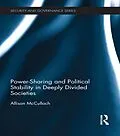Nearly all the peace accords signed in the last two decades have included power-sharing in one form or another. The notion of both majority and minority segments co-operating for the purposes of political stability has informed both international policy prescriptions for post-conflict zones and home-grown power-sharing pacts across the globe.
This book examines the effect of power-sharing forms of governance in bringing about political stability amid deep divisions. It is the first major comparison of two power-sharing designs - consociationalism and centripetalism - and it assesses a number of cases central to the debate, including Nigeria, Sri Lanka, Fiji, Bosnia and Herzegovina, Burundi and Northern Ireland. Drawing on information from a variety of sources, such as political party manifestoes and websites, media coverage, think tank reports, and election results, the author reaches significant conclusions about power-sharing as an invaluable conflict-management device.
This text will be of key interest to students and scholars of ethnic conflict management, power-sharing, ethnic politics, democracy and democratization, comparative constitutional design, comparative politics, intervention and peace-building.
Autorentext
Allison McCulloch is an Associate Professor in the Department of Political Science at Brandon University.
Inhalt
1 Power-Sharing, Political Stability and Deep Divisions 2 Consociationalism, Centripetalism and The Intellectual Conflict 3 Consociationalism 4 Centripetalism Chapter 5 Context Matters
